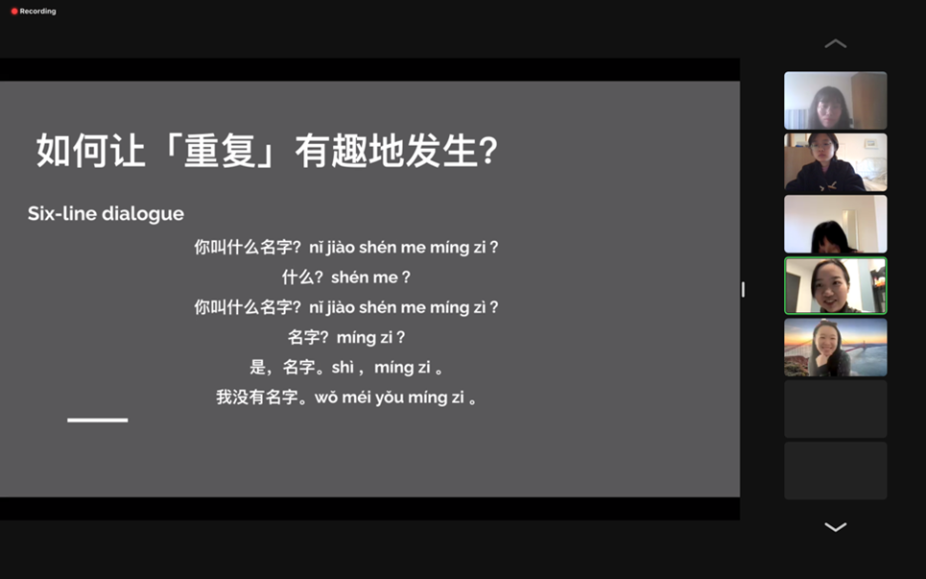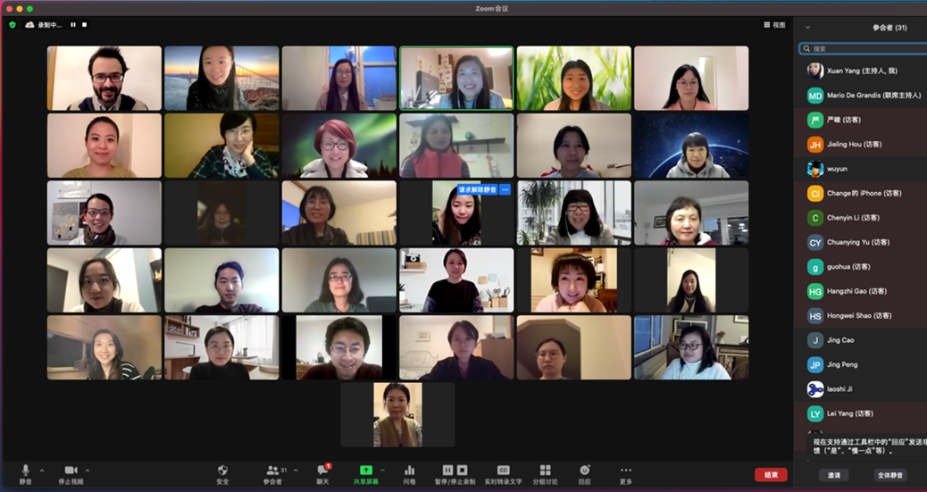The 2022 Spring UCD Confucius Institute for Ireland Online Teacher Training Successfully Held
The 2022 Spring UCD Confucius Institute for Ireland (CII) Online Teacher Training was held on January 12th to provide a platform for sharing teaching experience and improving teaching quality. The one-day training was hosted by Dr Mario De Grandis, a teacher from the UCD Irish Institute for Chinese Studies, and Ms Xuan Yang, a sponsored Chinese teacher, and was joined by 6 outstanding teachers selected from various classes, who delivered 7 excellent presentations. In addition, UCD CII Co-director Mr Wei Zhang announced regulations rolled out by the Centre for Language Education and Cooperation on teaching hours of local and volunteer teachers; he also expressed his gratitude on behalf of UCD CII to all the teachers and staff members for their continuous hard work during the Covid-19 pandemic.
The training kicked off at 9am on January 12th. The first presentation was delivered by Ms Xinlu Li, who encouraged all teachers to reconsider innovative language classrooms based on her own experience as a volunteer teacher and her academic background studying drama, English and American literature. She demonstrated how repetition can be fun through interesting and fun games and drama activities so as to sustain students’ curiosity. The focus of Dr Mario De Grandis’ presentation was on how to create more inclusive second language classrooms. Dr Mario discussed the definition of classroom inclusion and diversity, asked the question of correcting learner’s Chinese pronunciations, for which all participants shared their own case studies. Another teacher Lei Yang discussed the application of video materials in Chinese teaching through 6 real stories, in which video materials were compared with other materials as to demonstrate the benefits of using short videos, long videos and films in teaching. All the video materials used in the presentation were visually helpful and down to earth.
Yingfeng Ni started the afternoon session with a discussion on how to keep students motivated in young children’s Chinese classes, including real teaching clips and popular classroom games. Hangzhi Gao shared some strategies of introduction and enhancement of class teaching, emphasizing that the introduction should be real, interesting and effective while enhancement should involve the whole class and incorporate motion and stillness. In Gao’s opinion, there’re no fixed rules to teaching but a good teaching practice is to make adjustments based on teaching content and students and not be subject to any limitation on tools or conditions in one’s teaching. Hongwei Shao’s discussion on creative interaction in the classroom started with the essential question- what kind of teacher do we wish to be and included 3 case studies based on the teacher’s own teaching activities, leading to Gao’s conclusion that edutainment (or education through entertainment) is key as interest is the first step to success. The presentation inspired a lively discussion among participants.
The 2nd session in the afternoon began with Wei Zhou’s presentation on advanced Chinese teaching and class teaching design based on themes. The presentation used the textbook a New Chinese Course 3--Protect our Planet as an example to introduce the theory of thematic teaching, and to share the teacher’s own classroom teaching clips so as to better understand the teaching process and content delivery. The participants found the topic enormously interesting. The last but equally inspiring presentation was delivered by Jun Yan, who discussed interactive teaching model developing for one-to-one adult Chinese online classes following a 6-step process, namely knowing the learner, identifying the class, determining the style, understanding the steps, explaining the procedure and reviewing. In Yan’s opinion, it is the teacher’s responsibility to try different methods and learn from each method so that they can create unique teaching styles, listen to learner’s feedback and keep adjusting and improving their teaching.
The online training came to an end with a group photo of all the participants. In conclusion, the training was comprehensive despite its tight schedule, covering topics such as secondary class, children’s class, one-to-one online classes. The training played an important part in uplifting CII’s overall teaching standard, improving teachers’ skills as well as enriching teaching contents in the classroom.


